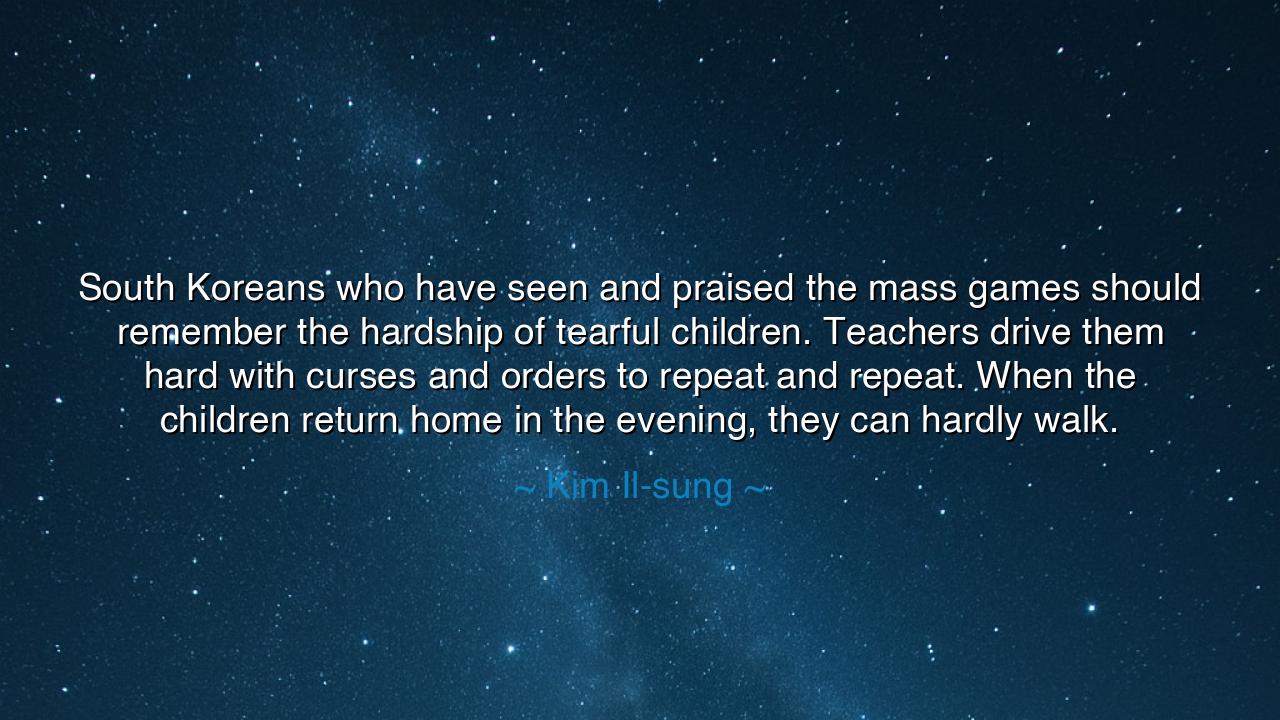
South Koreans who have seen and praised the mass games should
South Koreans who have seen and praised the mass games should remember the hardship of tearful children. Teachers drive them hard with curses and orders to repeat and repeat. When the children return home in the evening, they can hardly walk.






The words of Kim Il-sung — “South Koreans who have seen and praised the mass games should remember the hardship of tearful children. Teachers drive them hard with curses and orders to repeat and repeat. When the children return home in the evening, they can hardly walk.” — pierce the veil of spectacle and reveal the sorrow that often hides behind perfection. Beneath his statement lies a profound truth about discipline, sacrifice, and the cost of beauty when it is demanded by force rather than inspired by joy. His words remind us that what dazzles the eye may sometimes wound the soul, and that greatness achieved through cruelty leaves a shadow long after the applause fades.
The mass games of North Korea — vast performances in which thousands of children and adults move in perfect unison — were intended to symbolize unity, harmony, and collective strength. To those who witness them, they seem the very image of order and devotion, of a people bound together in purpose. Yet, as Kim Il-sung himself observed, this flawless precision was born of pain. Behind every synchronized movement was a child trembling from exhaustion, every wave of color painted by hands that ached. The spectacle was not a celebration of spirit, but of endurance — a mirror of the state’s unyielding demand for perfection. The leader’s warning, therefore, was not against the performance itself, but against the blindness of admiration without empathy.
In his words, one can hear the echo of an ancient truth: that the pursuit of perfection can become tyranny when it forgets compassion. In every age, rulers and societies have demanded greatness at the expense of the innocent. The pyramids of Egypt rose from the sweat of thousands who toiled under the desert sun. The cathedrals of medieval Europe soared heavenward on the backs of nameless laborers. The glory of these creations cannot erase the suffering that built them. Likewise, Kim’s observation reminds us that the human spirit is not meant to be a cog in the machinery of glory — it is sacred, fragile, and must be nurtured, not broken.
Consider the tale of the Spartan youth, who from childhood were trained for war with merciless rigor. They were denied comfort, beaten for weakness, and taught to hide pain behind silence. The world admired their strength, their discipline, their might. Yet behind that iron facade was the tragedy of stolen childhood — boys who never learned laughter, men who knew only conquest. The Spartans built an empire of warriors, but not of joy. So too, in the modern world, when we glorify collective perfection without compassion, we repeat this ancient mistake — praising the form and forgetting the flesh.
Kim Il-sung’s reflection carries a paradox. He, who led a nation through ideology and control, here speaks with the voice of one who has glimpsed the human cost of his own system. Whether his words were spoken in regret or instruction, they strike at the core of moral leadership: that the true strength of a nation lies not in the perfection of its displays, but in the well-being of its people. The image of “tearful children” becomes a universal symbol — for every society, every era, where innocence is sacrificed to ambition, where children are taught to obey before they are allowed to dream.
The deeper wisdom of this quote, then, is a call to see beyond appearances. It reminds us that the true measure of greatness is not how dazzling our achievements appear to others, but how humanely they were made. A nation, a company, a family — any institution — that builds its success upon fear or suffering has already sown the seeds of its own decay. For beauty born of cruelty cannot endure; it erodes from within, leaving only the hollow echo of what might have been.
The lesson is simple yet profound: honor the human before the ideal. When you witness greatness, ask what it cost. When you admire excellence, remember the labor behind it. Let no praise blind you to the tears of those who made it possible. True harmony is not forced through repetition or fear, but nurtured through compassion and shared purpose. Let us, therefore, teach our children not to move in unison out of fear, but to act with integrity out of love — for a society that guards the joy of its youngest will stand stronger and shine brighter than one that crushes them in pursuit of perfection.
So let these words of Kim Il-sung be remembered not as the lament of a ruler, but as a timeless warning to all who lead, teach, and create: never sacrifice the soul for the sake of the spectacle. For when the lights dim and the music fades, what remains is not the image of glory, but the measure of our compassion — and that alone will determine the true greatness of our age.






AAdministratorAdministrator
Welcome, honored guests. Please leave a comment, we will respond soon